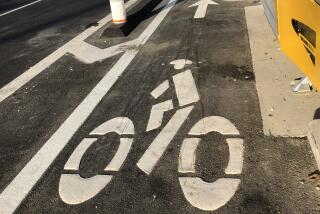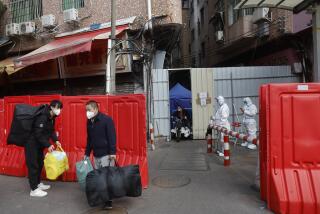Bikes Get a Boost From SARS as Fearful Chinese Shun Buses
- Share via
SHANGHAI — Yang Yongfang used to take the bus to her job as a switchboard operator at a Shanghai elevator factory. But when Yang looks at the bus these days, she sees “a big box stuffed with people. They’re all breathing in there. It seems very unsafe.”
Fearful of severe acute respiratory syndrome, Yang dusted off her three-speed bicycle and now rides it to work. She’s being joined by countless other Chinese who, until recently, appeared to be steering away from two-wheeled transportation.
“I have a good time, I get to think to myself for a while, and I’m keeping in better shape,” said Yang, 32.
She gestured to her husband, Zhou Wenbing, 37, an electrical repairman who still rides the bus, then rubbed his ever-so-slight paunch. “I wish he would ride a bicycle to work too,” she said with a laugh.
Without a doubt, China had plenty of bicycles long before SARS came on the scene. But after years in which growing legions of private automobiles crowded bicycles off the streets in China’s biggest cities, there is a sudden resurgence in bicycle traffic as fears of SARS have led many people to shun crowded trains and buses.
Here in Shanghai, for instance, the local Public Security Bureau said 120,000 bicycles were newly registered in April, far above last year’s monthly average of 50,000.
People’s Daily recently reported that “bicycle” had abruptly become the third most frequently searched term on the nation’s largest Web search engine.
National education officials in Beijing sent out a notice to educators in several major cities last month, telling them to urge students to ride bicycles or walk to school as a way both to get more exercise and to help thin the mobs in public buses.
For now, the noticeable increase in bicycle traffic is great news for bicycle manufacturers, many of whom had been lamenting a sharp drop in business in recent years.
A Shanghai-based manufacturer named Phoenix, for instance, said last year that sales had dived by nearly 50% compared with the previous year.
“It’s a golden opportunity,” said Zhao Weidong, editor of Shanghai Bicycle Trends, a trade magazine. “All of our companies are very excited about this current market.”
China’s private automobile industry, already the world’s fastest-growing, may also be getting an extra boost because of SARS. Last year, for the first time, car sales in China topped 1 million, and production last month reached 166,900, up 80% from the same month in 2002, according to China’s Bureau of Statistics. Many manufacturers have predicted that SARS will only speed up the pace.
“There is a panic about taking public transportation, which may lead a lot of people to make a quicker decision about buying a car than they had originally planned,” said Xue Hao, a spokesman for Shanghai Automotive Industry Corp., one of China’s top three auto manufacturers. Sales in April were up 32% over last year, he said.
Such claims were met with skepticism by shoppers at a gleaming auto showroom along Shanghai’s busy Nanjing Road. They said the biggest factor that a typical Chinese car buyer has to consider is the most basic one: whether he or she can afford it.
“I don’t know anyone who would buy a car just because of SARS,” said Du Hua, 28, a medical-supplies salesman who was looking longingly at a $23,000 Toyota sedan, far beyond his reach.
“It’s all based on your economic ability,” Du said. “If you can buy a car, you buy a car.”
Some dealers, however, seemed to think that SARS could be used to freshen up their sales pitch.
“Well, it might be true,” Shan Yong, a salesman for Shanghai Saima Car Sales, said of the notion that SARS might be spurring sales. “People have not told me that from their lips, but maybe it’s on their minds: ‘Oh, there could be SARS out there, I need to buy a car.’ It could make some sense.”
In fact, Shan noted, monthly sales were up about 15% from the month before.
If both bike and car sales shoot upward, it could amount to a nightmare for traffic planners here, who were already contending with the often-deadly clash between bikes and motorized vehicles. Shanghai officially averages nearly one traffic-related bicycle fatality a day, a figure that many here dismiss as too low.
Perhaps the most intriguing question raised by the upsurge in bicycles is whether it could actually prompt planners to rethink the bike’s role as Shanghai rushes into a modernization scheme intended to enhance its role as a financial and cultural crossroads of Asia.
That has already happened to a small degree in Beijing, where officials are hoping to clean the polluted air in advance of the 2008 Olympic Games. Beijing has added new bicycle routes and is exhorting its citizenry to ride bicycles more.
But urban planners in Shanghai have scorned the bicycle, to the great ire of bicycle advocates and environmentalists. In fact, bicycles have been banned altogether on 59 major Shanghai roadways, and the ever-expanding network of expressways and over- and underpasses that snake through the city have made it increasingly difficult to get around.
The danger is such that Yang’s husband, Zhou, said he prefers to take his chances on the bus, where he guards against SARS by wearing a face mask and staying near a window.
“Of course, riding a bike might be better for my health,” Zhou said. “But there is a big bridge, and I would have to carry the bike up some stairs. It’s hard to do.”
Said Yang: “Oh, those are excuses, excuses.”
And not the only ones. In today’s get-ahead China, some say it’s simply unthinkable to show up at work drenched in sweat from a bike ride.
“I’m a businessman,” said Huang Xu, 27, deputy general manager of a company that sells housing construction material, as he watched some bicyclists on Nanjing Road. “I have an image to project.”
For some young people, bicycle riding doesn’t even come naturally.
“Our generation does not always think to hop on a bicycle,” said Wu Xufen, 21, a computer science student at Shanghai Second Polytechnic University, who said she was using a bike now to steer clear of buses. “Older people are more used to doing that. They were riding bikes even before there was public transportation.”
But among those who have gotten themselves aboard bicycles more frequently because of SARS fears, many said they have found it a highly enjoyable way to get to work.
“I have a bicycle but never used it to commute before,” said Zhang Aihua, a young municipal employee on her way to a downtown office. “But in April, I started to bike to work instead of taking the bus. Several friends of mine were scared, and we all began to ride.
“It usually takes me more than one hour one way,” she added. “But it keeps me away from the crowds on buses and it gives me a great opportunity to get physical exercise.”
Zhang said she had, in fact, become a bicycling convert: “Even when the SARS crisis is over, I will just keep riding.”
More to Read
Sign up for Essential California
The most important California stories and recommendations in your inbox every morning.
You may occasionally receive promotional content from the Los Angeles Times.













